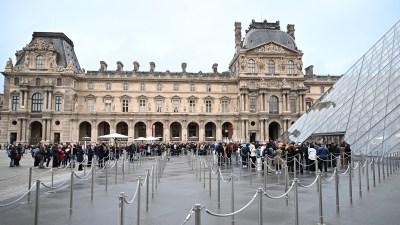‘Better than ever’ Iraq resolution in offing
UN Security Council members appeared on Thursday to be on the brink of agreeing a resolution disarming Iraq, a measure condemned in Baghdad ...

UN Security Council members appeared on Thursday to be on the brink of agreeing a resolution disarming Iraq, a measure condemned in Baghdad as ‘‘a declaration of an imperialist war’’.
|
‘Russia against unilateral use of force against Iraq’
|
|
MOSCOW: Russian Foreign Minister Igor Ivanov said here on Friday that Russia will not allow ‘‘automatic and unilateral’’ use of force against Iraq. He said Russia was opposed to any wording of a new UN Security Council resolution on Iraq authorising the unilateral automatic use of force by any country. ‘‘Russia opposes any formulations allowing anyone to use force automatically and unilaterally,’’ Ivanov said, adding that ‘‘force may be used only within the framework of a relevant UN Security Council’’. He pointed out, in this connection, that the approaches of the Security Council’s five permanent member with veto powers, to a ‘‘possible resolution on Iraq’’ have significantly come closer recently, although ‘‘significant differences still remain.’’ ‘‘These are about possible consequences for Iraq, in the case of UN inspectors facing problems in carrying out inspections. The use of force is involved,’’ Ivanov said. ‘‘We press for such a wording, which would, in case of detecting violations on the part of Iraq, bring the matter back to the Security Council. And it will be only up to the Security Council, upon close scrutiny, to decide what to do next in accordance with the UN Security Council Charter,’’ he noted. (Dadan Upadhyay) |
Diplomats at the United Nations said differences between the United States and France on the resolution were still crucial enough that the Bush administration would postpone a vote until after US mid-term elections on Tuesday, or run the risk of failure. ‘‘It is looking better than it ever was,’’ said one Western diplomat closely involved in the negotiations. ‘‘There is a small ravine left but it is still 400 feet deep.’’
He said language was being exchanged among capitals of the key players and in New York on the resolution, which gives UN inspectors licence to search anywhere for Iraq’s weapons of mass destruction and threatens ‘‘serious consequences’’ if Baghdad balks.
Iraq, which denies hiding weapons of mass destruction, said the ‘‘aggressive resolution distorts facts, imposes oppressive and impossible conditions and is a declaration of an imperialist war against Iraq.’’
The statement from the Iraqi Foreign Ministry also voiced suspicion at President George W. Bush’s meeting with Chief UN arms inspectors Hans Blix and Mohamed ElBaradei on Wednesday, saying Washington was harbouring sinister intentions.
Blix and ElBaradei gave Bush and US Vice-President DickCheney an update on the Iraqi situation, and Bush told them of his desire for a rigorous inspection system. Iraq has agreed to allow arms inspectors to return after a four-year absence, and said it would give them unfettered access to suspected weapons sites. But the US has asked the inspectors to stay put while it seeks a tougher mandate.
At issue is what France, Russia and China call ‘‘hidden triggers’’ in the US — and British-sponsored resolution that would allow Washington to launch a military strike, overthrow Saddam and claim afterward it had UN authorisation.
France, which is leading the resistance with broad support,wants to postpone any possible use of force until after the council ascertains that Iraq was in further ‘‘material breach’’ of its obligations.
The US has agreed to put off any military strike until after Blix reports to the Security Council on Iraqi violations. But it has resisted France’s call to tie future action to a decision by the council on the seriousness of Baghdad’s failure to comply. The full council has not scheduled another meeting for this week but Syria has invited the 10 rotating Security Council members to a meeting with Blix to hear about his session with Bush.
Iraqi Opposition leaders said only US Military might could oust Saddam — but the less force Washington used and the sooner it let Iraqis run their country, the better.





- 01
- 02
- 03
- 04
- 05


























